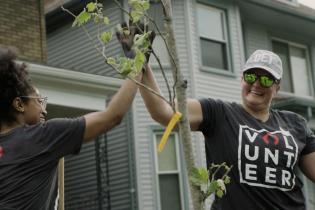
NFWF Announces $1.7 Million in Conservation Grants to Improve Community and Habitat Resilience in Southeast Michigan
Public-private partnership funds six projects to improve water quality, enhance habitat and increase accessibility to public green space
DETROIT (March 13, 2023) – Southeast Michigan Resilience Fund partners today announced $1.7 million in grant funding to six projects that will benefit communities and wildlife habitats in southeast Michigan. The grants awarded by the National Fish and Wildlife Foundation (NFWF) will leverage $3.5 million in matching contributions to generate a total conservation impact of more than $5.2 million. This program receives significant support through the Great Lakes Restoration Initiative (GLRI).
These investments will strengthen regional resilience and improve water quality for communities by installing green infrastructure, increasing urban tree canopy and restoring riparian and floodplain habitat. The projects selected for funding will provide critical habitat for wildlife such as monarch butterflies and migratory birds, while also creating and enhancing public access.
“The grants awarded today will create public greenspace and improve water quality and urban tree canopy. These investments will enhance the quality and connectivity of habitat and make it more accessible for people and increase community resilience by creating and improving green infrastructure,” said Jeff Trandahl, executive director and CEO of NFWF.
“Leveraging Great Lakes Restoration Initiative dollars through the Southeast Michigan Resilience Fund exemplifies the strength of public-private partnerships,” said Chris Korleski, Director of the U.S. Environmental Protection Agency’s Great Lakes National Program Office. “We will continue to invest in Southeast Michigan communities, especially historically disadvantaged communities, delivering on-the-ground projects where they make a difference.”
“The Ralph C. Wilson, Jr. Foundation is proud to team up with the National Fish and Wildlife Foundation to support improved resiliency and stormwater capture in Southeast Michigan,” said JJ Tighe, Director, Parks & Trails Initiative. “This partnership is a great example of how collaboration between public and private partners can advance innovative solutions to address the many challenges posed by climate change.”
“Addressing climate change mitigation and adaptation is critical to Kresge’s mission,” said Yeou-Rong Jih, program officer for The Kresge Foundation’s Environment Program. “The equitable deployment of green stormwater infrastructure and flood control go hand-in-hand with the need to advance climate-resilient approaches to urban stormwater and wastewater management in southeast Michigan. These investments will not only enhance natural public spaces, but they also address the deep needs to control stormwater runoff made worse by climate change.”
The projects supported by these grants will:
- Add 4.4 million gallons of stormwater storage
- Plant more than 60,300 trees for increased stormwater storage and habitat
- Restore 65 acres through invasive species control
- Help restore the quality and connectivity of the region’s unique habitats
- Improve quality of life by increasing public access to natural areas and parks through five new access points
“We are honored to support these amazing organizations through an effective and collaborative funding effort,” said Dr. Neil Hawkins, president of the Fred A. and Barbara M. Erb Family Foundation. “The diverse projects backed by the Southeast Michigan Resilience Fund partners focus on protecting the Great Lakes ecosystem, as well as help strengthen quality of life and pride of place in our local communities.”
Seven corporate, foundation and government funding partners have joined NFWF to support the Southeast Michigan Resilience Fund:
- Cleveland-Cliffs
- Fred A. and Barbara M. Erb Family Foundation
- The Kresge Foundation
- The Ralph C. Wilson, Jr. Foundation
- The U.S. Environmental Protection Agency
- The U.S. Fish and Wildlife Service
- The U.S. Forest Service
Southeast Michigan Resilience Fund 2023 grant recipients include:
- National Wildlife Federation, to expand a network of green stormwater infrastructure demonstration sites aimed to increase pervious acreage and develop a self-sustaining network of engaged stewards through programing in Detroit.
- Reroot Pontiac, to repurpose urban lots for green stormwater infrastructure pocket forests and larger urban forest installations in Pontiac.
- Friends of the Rouge, to enhance existing public spaces in underserved communities using placemaking strategies including bioretention features to create habitat and control stormwater runoff, while building capacity for municipalities to expand green stormwater infrastructure in public spaces.
- Legacy Land Conservancy, to remove invasive species and prepare a management plan to restore habitat and open public access to the Kolon-Baki Nature Preserve, a rolling oak-hickory forested property featuring intermittent wetlands and remnant fen habitat.
- Monroe Public Schools, to restore critical ecosystem function of upland, wetland, and riparian areas and enhance visitor infrastructure and educational resources at Knabusch Math & Science Center at Lake Erie in Monroe.
- St. Suzanne Cody Rouge Community Resource Center, to support a network of churches in northwest Detroit to maintain existing bioretention practices, install new green stormwater infrastructure, and provide training programs.
Since 2018, the Southeast Michigan Resilience Fund has awarded 34 grants totaling more than $7.7 million, leveraging an additional $10.6 million in matching contributions to generate a total conservation investment of more than $18.3 million.
For additional information on the grants awarded today, please click here, and to learn more about the Southeast Michigan Resilience Fund, please visit nfwf.org/semichigan.
About the National Fish and Wildlife Foundation
The National Fish and Wildlife Foundation (NFWF) works with the public and private sectors to sustain, restore and enhance the nation’s fish, wildlife, plants and habitats for current and future generations. Chartered by Congress in 1984, NFWF has grown to become the nation’s largest private conservation grant-maker, funding more than 21,600 projects and generating a total conservation impact of $8.1 billion. Learn more at nfwf.org.
About Cleveland-Cliffs
Cleveland-Cliffs is the largest flat-rolled steel producer in North America. Founded in 1847 as a mine operator, Cliffs also is the largest manufacturer of iron ore pellets in North America. The Company is vertically integrated from mined raw materials, direct reduced iron, and ferrous scrap to primary steelmaking and downstream finishing, stamping, tooling, and tubing. Cleveland-Cliffs is the largest supplier of steel to the automotive industry in North America and serves a diverse range of other markets due to our comprehensive offering of flat-rolled steel products. Headquartered in Cleveland, Ohio, Cleveland-Cliffs employs approximately 27,000 people across its operations in the United States and Canada.
About Fred A. and Barbara M. Erb Family Foundation
The Fred A. and Barbara M. Erb Family Foundation’s mission is to advance an environmentally healthy and culturally vibrant metropolitan Detroit and a flourishing Great Lakes ecosystem. The Foundation is focused on improving water quality, especially in the watersheds impacting metro Detroit and Bayfield, Ontario; promoting environmental health, justice and sustainable business; and supporting the arts as a means to strengthen the metropolitan Detroit region. For more information, visit erbff.org.
About The Kresge Foundation
The Kresge Foundation was founded in 1924 to promote human progress. Today, Kresge fulfills that mission by building and strengthening pathways to opportunity for low-income people in America’s cities, seeking to dismantle structural and systemic barriers to equality and justice. Using a full array of grant, loan, and other investment tools, Kresge invests more than $160 million annually to foster economic and social change. For more information visit kresge.org.
About the Ralph C. Wilson Jr. Foundation
The Ralph C. Wilson, Jr. Foundation is a grantmaking organization dedicated primarily to sustained investment in the quality of life of the people of Southeast Michigan and Western New York. The two areas reflect the devotion of Ralph C. Wilson, Jr. to his hometown of Detroit and greater Buffalo, home of his beloved Buffalo Bills NFL team. Prior to his passing in 2014, Mr. Wilson provided that a significant share of his estate be used to continue a life-long generosity of spirit by funding the Foundation that bears his name. Based in Detroit, the Foundation began with a grantmaking capacity of $1.2 billion over a 20-year period, which expires January 8, 2035. This structure is consistent with Mr. Wilson’s desire for the Foundation’s impact to be immediate, substantial, measurable, and overseen by those who knew him best. For more information visit www.rcwjrf.org.
About the U.S. Environmental Protection Agency
The U.S. Environmental Protection Agency (EPA) leads the nation’s environmental science, research, education, and assessment efforts. The mission of the Environmental Protection Agency is to protect human health and the environment. Since 1970, EPA has been working for a cleaner, healthier environment for the American people. For more information, visit epa.gov.
About the U.S. Fish and Wildlife Service
The mission of the U.S. Fish and Wildlife Service is to work with others to conserve, protect and enhance fish, wildlife, plants and their habitats for the continuing benefit of the American people. We are both a leader and trusted partner in fish and wildlife conservation, known for our scientific excellence, stewardship of lands and natural resources, dedicated professionals, and commitment to public service. For more information on our work and the people who make it happen, visit fws.gov.
About the U.S. Forest Service
Established in 1905, the Forest Service’s mission is to sustain the health, diversity, and productivity of the nation’s forests and grasslands to meet the needs of present and future generations. The agency manages 193 million acres of public land; provides technical and financial assistance to state, private, and tribal forestry agencies; and maintains one of the largest forestry research organizations in the world. Public lands managed by the Forest Service provide 20 percent of the nation’s clean water supply and contribute more than $13 billion to the economy each year through visitor spending alone. The agency also supports sustainable management on about 500 million acres of private, state and tribal forests including forests in urban areas. For more information, visit www.fs.usda.gov.
###
Contact:
Rob Blumenthal, rob.blumenthal@nfwf.org, 202-857-0166

